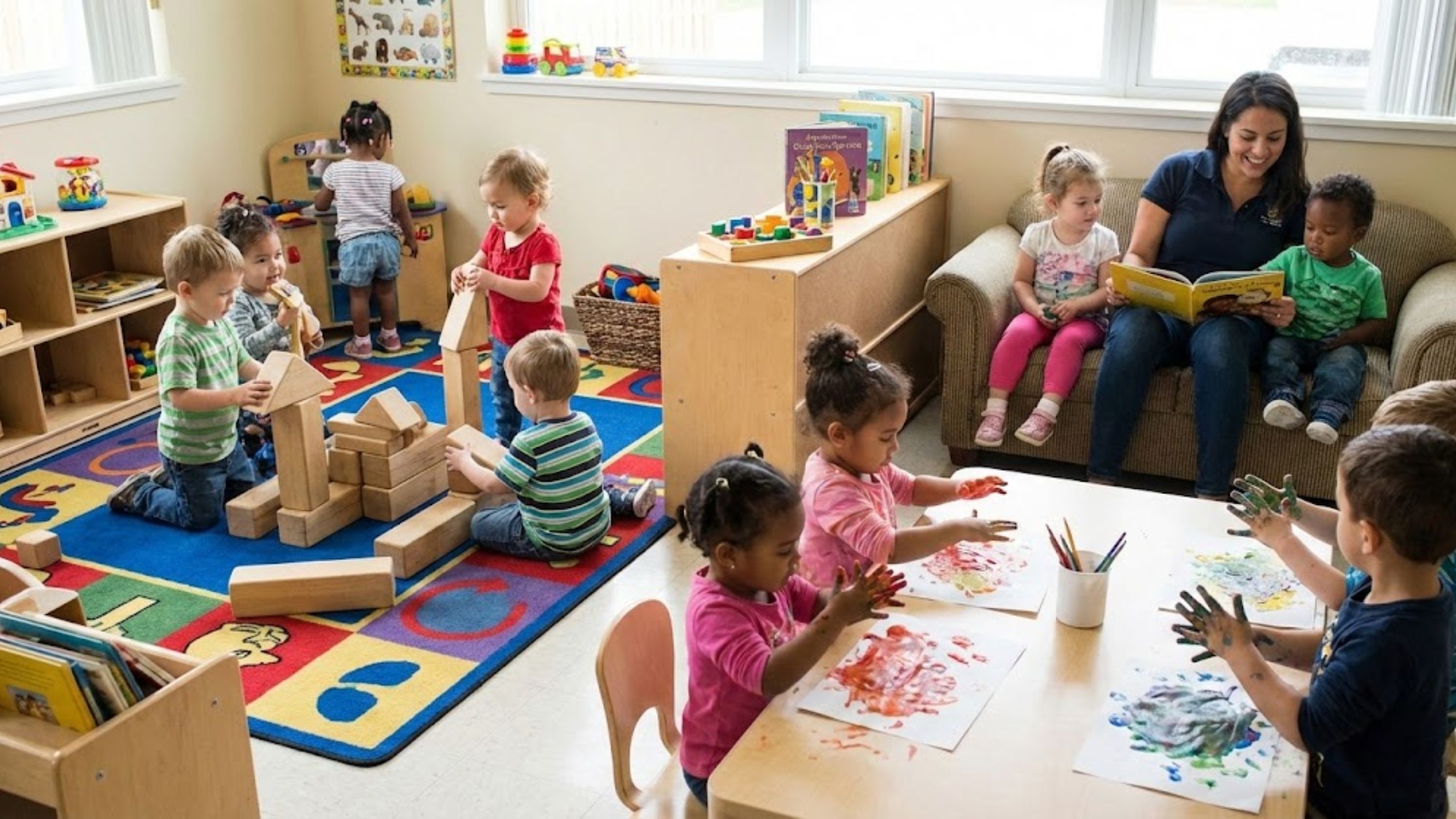Are you ready to open the secret garden of your child’s potential?
Nursery rhymes act as seeds of knowledge, immersing into a world of development and growth for your little one.
From sparking creativity to laying the groundwork for essential skills, these rhythmic verses hold the key to a treasure trove of benefits for your child.
Immerse into this exploration of how nursery rhymes can shape your child’s abilities and watch as they flourish in a symphony of learning and discovery.
10 Benefits of Nursery Rhymes for Your Child’s Development:
The Role of Nursery Rhymes in Development
Nursery rhymes play an important role in fostering various aspects of child development, from cognitive skills to social interactions and physical coordination. Engaging with these delightful rhymes offers numerous benefits of nursery rhymes as your brain absorbs new information and makes connections. The repetition of rhymes and stories actually enhances brain function by improving memory, concentration, spatial intelligence, and thinking skills. By listening to and reciting nursery rhymes, children also learn to segment words into syllables and recognize similarities between rhyming words. This helps in identifying words with similar starting sounds, a fantastic skill to have for future learning.
Additionally, nursery rhymes aren’t just fun; they support language and literacy skills, illustrating the benefits of nursery rhymes in early education. As children enjoy these rhymes, they aid in language acquisition and speech development. Nursery rhymes help develop auditory discrimination skills, enhance listening comprehension, and expand vocabulary. These rhymes also introduce children to story structures with a beginning, middle, and end, crucial for reading more complex stories in the future. So, keep singing, reciting, and enjoying the benefits of nursery rhymes, as they’re truly magical in boosting development in various essential areas!
Enhancing Language Acquisition Skills
When you engage with nursery rhymes, you’ll discover a world of words waiting to be explored.
These rhymes help you learn new words and understand how sounds come together to create rhythm.
As you recite these rhymes, you’ll feel more confident expressing yourself through speech.
Vocabulary Expansion Through Rhymes
Expanding your child’s vocabulary through rhymes is like planting seeds of language that blossom into a colorful garden of words and expressions. Nursery rhymes introduce new vocabulary in a fun and engaging way, helping your child learn and remember words more effectively.
By reciting rhymes, your child not only picks up new words but also improves listening and comprehension skills. The rhythmic patterns and repetition in rhymes make it easier for children to grasp and remember words, enhancing their language acquisition abilities.
Through these playful verses, your child can explore a world of language, expanding their vocabulary and laying a strong foundation for effective communication in the future.
Understanding Phonics and Rhythm
To fully embrace the richness of language and enhance your child’s acquisition skills, exploring the rhythmic patterns and phonics of nursery rhymes can be an exciting journey.
Nursery rhymes play an important role in helping your child understand phonics, which is the relationship between sounds and letters.
The rhythmic nature of these rhymes helps in recognizing patterns and sequences in words, making language acquisition a playful experience.
By engaging with nursery rhymes, your child can develop a keen ear for sounds, identify similarities between words, and grasp the concept of rhyming words.
This foundation in phonics and rhythm not only enhances language skills but also sets the stage for improved reading and writing abilities in the future.
Encouraging Expressive Speech
Encouraging expressive speech in children through engaging nursery rhymes can greatly enhance their language acquisition skills and foster a love for communication. Nursery rhymes assist in articulating words, practicing pitch, volume, and inflection, leading to clear enunciation and improved listening comprehension.
By reciting rhymes, children enhance vocabulary, language assimilation, and even promote spelling skills. Additionally, nursery rhymes introduce children to poetry, literary devices like alliteration, and imagery, sparking their creativity and imagination.
Through the rhythmic and engaging nature of nursery rhymes, children can develop a deep appreciation for language and storytelling. Embracing nursery rhymes as a tool for expressive speech not only aids in language development but also nurtures a child’s ability to communicate effectively and express themselves confidently.
Nursery Rhymes and Phonemic Awareness
Nursery rhymes play an important role in developing phonemic awareness in young children, showcasing one of the many benefits of nursery rhymes. These rhymes help children tune their ears to the sounds of language, making it easier for them to identify and manipulate individual sounds, which are essential skills for reading and writing. When children engage with nursery rhymes, they start noticing how words can be broken down into syllables and recognize patterns in rhyming words. This process of playing with sounds lays a strong foundation for phonemic awareness, a critical aspect of the benefits of nursery rhymes.
By reciting nursery rhymes, children learn to distinguish between similar sounds like ‘cat’ and ‘bat,’ which is vital for spelling and reading. The repetitive nature of nursery rhymes also helps in reinforcing these sound patterns, making it easier for children to remember and apply them in their language development. Furthermore, as children become more attuned to the sounds of language through nursery rhymes, they are better equipped to tackle more complex phonics skills in the future. This enhancement of phonics skills is yet another of the benefits of nursery rhymes in a child’s early education.
Additionally, as children become more attuned to the sounds of language through nursery rhymes, they’re better equipped to tackle more complex phonics skills in the future.
Cognitive Development Through Rhymes
As children engage with nursery rhymes, they develop important cognitive skills that benefit their overall brain function and thinking abilities. Repetition of rhymes aids in brain development by enhancing memory, concentration, and spatial intelligence. Through rhymes, children learn to segment words into syllables, which helps in recognizing similarities between rhyming words and identifying words with similar starting sounds. This process of breaking down words and recognizing patterns strengthens their cognitive abilities and lays a foundation for more complex language skills.
Moreover, nursery rhymes assist in memorization and thinking skills. The rhythmic and repetitive nature of rhymes supports memory retention, making it easier for children to recall information. By engaging with rhymes, children exercise their brains in a fun and interactive way, which contributes to their overall cognitive development. This cognitive stimulation at a young age can have long-lasting benefits on their academic performance and problem-solving abilities as they grow.
Incorporating nursery rhymes into daily routines provides children with a playful yet effective way to boost their cognitive development. By encouraging them to engage with these rhymes, you aren’t only fostering a love for language and literature but also laying a strong cognitive foundation that will benefit them in various aspects of their lives.
Emotional Growth Supported by Rhymes
Nursery rhymes aren’t just about fun; they can also help you understand and express your feelings better.
By listening to rhymes about different emotions, you can learn to recognize and name how you’re feeling.
Rhymes can teach you about empathy and how to support others when they’re happy, sad, or scared.
Fostering Emotional Intelligence
Engage children in the world of emotions through the enchanting land of nursery rhymes, fostering their emotional intelligence and growth. Nursery rhymes provide a safe space for children to explore various feelings like joy, sadness, excitement, and fear in a fun and engaging way.
By singing rhymes about different emotions, kids learn to recognize and express their feelings effectively. This emotional awareness helps them develop empathy towards others and build stronger relationships. As children connect with the characters and stories in the rhymes, they begin to understand the complexities of emotions, enhancing their emotional intelligence.
Through the rhythmic and melodic nature of nursery rhymes, children can regulate their emotions, find comfort in challenging situations, and develop a sense of emotional stability.
Rhymes and Empathy Development
In exploring the domain of emotions through the enchanting world of nursery rhymes, children set off on a journey towards nurturing empathy and emotional growth. Rhymes, with their engaging stories and characters, help kids understand different feelings and perspectives.
As you recite and act out rhymes, you learn to empathize with the characters’ situations, developing compassion and the ability to relate to others. Through rhymes, you grasp the concept of emotions like joy, sadness, or fear, laying a foundation for understanding and expressing your feelings.
This emotional intelligence cultivated through nursery rhymes not only supports your relationships with peers but also aids in maneuvering various social situations with empathy and kindness.
Rhymes for Motor Skills Enhancement
Enhance your child’s motor skills development through engaging nursery rhymes that incorporate physical movements and actions. Nursery rhymes can be a fun and effective way to enhance your child’s coordination, balance, and fine motor skills. Rhymes like ‘The Wheels on the Bus’ or ‘Head, Shoulders, Knees, and Toes’ involve actions that help improve rhythm and movement capabilities. By linking specific movements to words in rhymes, your child can develop better control over their body and enhance their physical coordination.
Engaging in nursery rhymes that involve physical activities can also benefit your child’s brain development. The actions in these rhymes help stimulate brain areas related to planning and motor skills. Additionally, early exposure to music and movement through nursery rhymes can have a positive impact on your child’s overall development. Encouraging your child to participate in these physical activities while reciting rhymes provides a holistic approach to learning and development.
Incorporating physical movements into nursery rhymes not only enhances your child’s motor skills but also makes learning enjoyable and engaging. By actively participating in these rhymes, your child can improve their coordination, balance, and overall physical development. So, next time you recite nursery rhymes with your child, don’t forget to include some fun actions to boost their motor skills development.
Building Social Skills Through Rhymes
Exploring nursery rhymes that encourage group activities and promote social interactions can be a delightful way to foster your child’s social skills and sense of camaraderie. Engaging in rhymes that involve actions or singing with others can help your child develop important social skills. Through participating in group activities like singing nursery rhymes together, children learn how to take turns, cooperate, and communicate effectively with their peers. These interactions lay a foundation for building relationships and developing empathy towards others.
Rhymes with elements of humor and playfulness can enhance your child’s social development by encouraging laughter and shared enjoyment with friends or family members. Such experiences help in creating bonds and a sense of belonging within a group. Additionally, nursery rhymes often provide comfort and support in challenging situations, fostering a sense of security and connection with others.
As your child engages in reciting rhymes with others, they not only benefit socially but also emotionally. Sharing these experiences with peers can boost their confidence, encourage self-expression, and create a sense of community. By incorporating nursery rhymes that promote social interactions into your child’s routine, you’re providing them with a fun and enriching way to develop essential social skills that will benefit them in various aspects of their lives.
Creative Expression and Nursery Rhymes
Nursery rhymes spark creativity and imagination in children, encouraging them to explore their artistic side through playful storytelling and expressive play. When kids engage with nursery rhymes, they enter a world where anything is possible. These rhymes serve as a canvas for their imagination to let loose, allowing them to act out different scenarios, create unique characters, and immerse themselves in a world of fantasy. By reciting and playing with nursery rhymes, children learn to express themselves creatively, whether through dramatic play, drawing, or crafting.
Through nursery rhymes, children can bring stories to life, inventing their own twists and turns, and adding personal flair to familiar tales. This creative expression not only enhances their storytelling abilities but also boosts their confidence in sharing their imaginative ideas with others. As they embody different characters and scenarios from the rhymes, children develop a deeper understanding of emotions, relationships, and the world around them.
Encouraging creative expression through nursery rhymes provides children with a safe space to explore their thoughts and feelings, fostering a sense of self-awareness and emotional intelligence. By engaging with these rhymes, kids learn to communicate their ideas effectively, think outside the box, and embrace their unique creative voices. Nursery rhymes serve as a gateway to a world where creativity knows no bounds, allowing children to set free their imaginations and express themselves freely.
Rhymes to Boost Memory and Concentration
Immerse your child in the magical world of rhythmic storytelling, where memory and concentration flourish through engaging nursery rhymes. Rhymes play an important role in enhancing cognitive skills by aiding memory retention and boosting concentration levels. The repetitive nature of nursery rhymes helps in storing information effectively in your child’s mind. As your child listens to and recites these rhymes, they exercise their brain, improving their ability to focus and remember details.
Through the patterns and rhythms present in nursery rhymes, your child learns to segment words into syllables, making language processing easier. This segmentation also assists in recognizing similarities between rhyming words and identifying words with similar starting sounds. Such activities not only support memory but also enhance concentration as your child actively engages with the rhymes to decipher these linguistic patterns.
Encouraging your child to interact with nursery rhymes regularly can contribute to their cognitive development. As they immerse themselves in the world of these rhythmic tales, they unknowingly sharpen their memory and concentration skills, setting a strong foundation for future learning endeavors. So, grab a book of nursery rhymes, sing along, and watch your child’s memory and concentration abilities bloom!
Encouraging Love for Reading and Rhymes
Engage your child’s imagination and curiosity through the enchanting world of mesmerizing stories and rhythmic rhymes that foster a deep love for reading. By introducing nursery rhymes early on, you can ignite a passion for storytelling and language exploration. Reading rhymes aloud can create a magical bonding experience between you and your child while also laying the foundation for strong literacy skills.
Encouraging a love for reading and rhymes not only cultivates a joy for books but also enhances language development. As you recite rhymes together, your child’s listening comprehension improves, vocabulary expands, and phonemic awareness grows. The rhythmic patterns in nursery rhymes make them easy to remember, boosting memory retention and cognitive skills.
Moreover, the creativity and imagination sparked by nursery rhymes can lead to inventive play and storytelling. Acting out scenes from rhymes encourages creative expression and imaginative thinking. These activities not only entertain but also nurture your child’s cognitive and emotional development.
Incorporating nursery rhymes into your daily routine can create a lifelong love for reading and learning. Whether it’s through bedtime stories or playful rhyming games, fostering a deep appreciation for language and storytelling early on sets the stage for a bright academic future filled with literary adventures.
Recapping the Benefits of Nursery Rhymes
In conclusion, understanding the benefits of nursery rhymes highlights just how crucial these simple songs are in the foundational stages of a child’s educational journey. Nursery rhymes are more than just playful tunes; they are powerful educational tools that enhance a child’s cognitive, linguistic, and social development. By incorporating nursery rhymes into early learning, we can give children a strong and joyful start in their educational path.
If you are seeking a nurturing environment that leverages the transformative power of nursery rhymes and other innovative educational strategies, consider Clever Bee Academy. Located in Northern Ohio, Clever Bee Academy offers comprehensive early childhood education programs designed to inspire and lead children to their full potential. From infancy through to twelve years old, our programs prepare your child for success in school and beyond, helping them to BEE the best they can BEE.
For more information on how Clever Bee Academy can make a positive difference in your child’s early education, please contact us today. Let us help your little ones turn their bright beginnings into even brighter futures.
Frequently Asked Questions About the Benefits of Nursery Rhymes
How Can Nursery Rhymes Be Used to Teach Cultural Diversity and Inclusivity to Children?
Engage children in diverse nursery rhymes to teach cultural inclusivity. Explore rhymes from various cultures, explaining traditions and languages. Encourage understanding and respect for differences through fun and rhythmic learning experiences.
Are There Specific Nursery Rhymes That Are Particularly Beneficial for Children With Special Needs or Developmental Delays?
For kids with special needs or delays, nursery rhymes can be extra helpful. Some rhymes with clear rhythms and simple language can aid in speech, memory, and social skills development. Try engaging options!
What Is the Impact of Nursery Rhymes on Children’s Emotional Intelligence and Empathy Development?
As you sway to the melodies of nursery rhymes, your heart expands like a blooming flower. Feelings blossom, empathy grows. Rhymes stir emotions, nurturing your soul. Immerse yourself in their world; empathy blooms.
Can Nursery Rhymes Be Used as a Tool for Teaching Children About Environmental Conservation and Sustainability?
Can nursery rhymes be used for teaching children about environmental conservation and sustainability? Yes! Rhymes with nature themes educate kids on caring for the planet. Fun lyrics engage them in eco-friendly practices, nurturing environmental awareness.
How Do Nursery Rhymes Contribute to the Development of Critical Thinking Skills in Children?
Explore nursery rhymes to boost your critical thinking skills! Rhymes engage your brain, enhance memory, and encourage creative problem-solving. Discover patterns, solve riddles, and think outside the box with fun and interactive rhymes!







